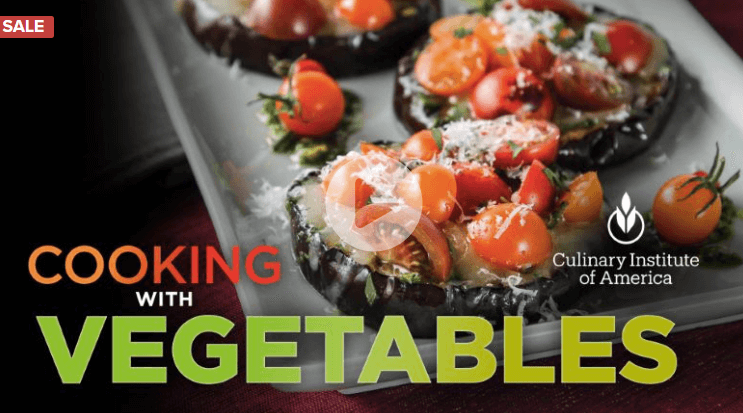🎁 Exclusive Discount Just for You!
Today only: Get 30% OFF this course. Use code MYDEAL30 at checkout. Don’t miss out!
Learn how to label and store leftovers the way chefs do, then discover how to transform your remaining cooked veggies into entirely new dishes. Create smashed potatoes with bravas sauce; tattooed fingerling potatoes; an egg frittata; and a red flannel hash combining potatoes, beets, parsnips, carrots, and onions.
File Size: 11.8 GB
Bill Briwa – The Everyday Gourmet – Cooking with Vegetables

Course Overview
Too often, vegetables are an afterthought when we cook. Whether served as a side dish or mindlessly heated from a frozen package, they have long been relegated to second-class status. But with the widespread appeal of the farm-to-table movement and chefs everywhere featuring seasonal produce and innovative cooking techniques to set their menus apart, vegetables have officially graduated from something we have to eat to something we want to eat.
Complex, vibrant, and versatile, vegetables are deeply satisfying when given the proper attention. But cooking them at home, however, can be daunting. Confusion can start right in the grocery store or farmers’ market. Should you choose that photo-worthy, overgrown zucchini or the smaller, less remarkable one? How do you know if an artichoke is past its prime? And once you bring your bounty home: Do the tomatoes go in the crisper or on the counter? How can you speed up the ripening of that rock-hard avocado—or keep a soft one from spoiling before you can use it?
The Everyday Gourmet: Cooking with Vegetables answers your questions and more about selecting and storing produce while revealing how you can take the same fresh ingredients, bright flavors, and unexpected combinations you love at restaurants and easily prepare them in your own kitchen every night of the week. Presented in 24 easy-to-follow lessons by Chef Bill Briwa, an award-winning Professor of Culinary Arts at the esteemed Culinary Institute of America at Greystone, this course provides the expert insight and techniques you need to elevate vegetables from supporting player to star attraction, no matter what your skill level. With step-by-step demonstrations of delicious main dishes, sides, soups, stews, and even desserts and cocktails, you’ll develop a culinary repertoire based on produce that is more varied, pleasurable, and nourishing than ever before.
This course delivers a broad range of ideas that can be accomplished quickly when time is limited as well as more elaborate preparations that you can experiment with when time allows or impress with at a dinner party. While these lessons do incorporate fish, chicken, and pork, they are also packed with vegetarian and vegan recipes that will delight carnivores and herbivores alike. You will find unique and surprising techniques to:
- Transform summer squash into a “pasta” studded with pecorino, almonds, tomatoes, and garlic.
- Reinterpret classic meat dishes without the meat in vegetable pot pie, carrot osso buco, cauliflower shawarma, celery root tonkatsu, and carrot tartare.
- Make guacamole tacos using thinly sliced jicama as your tortillas and tamales stuffed with maitake, trumpet royale, and button mushrooms.
- Turn out salads bursting with flavor, from kale with tapenade and pecorino to an esquites salad inspired by Mexican street corn.
- Prepare unexpected snacks such as yucca chips tinted with beet juice and pinzamonio, an Italian dish featuring thinly shaved vegetables.
- Create indulgent desserts, including carrot cake with parsnip frosting, corn ice cream with blackberry swirl, and maple custard baked in a pumpkin.
With an array of dishes from around the world—from Thai soup to chili rellenos to tabbouleh salad—your taste buds will never get bored.
Approach Cooking from a Plant-based Perspective
Filmed at the CIA’s Greystone campus in Napa Valley, California, each lesson brings you closer to achieving a new level of comfort with cleaning, cutting, seasoning, and cooking an enormous array of vegetables, from the common ones you may be in a rut with (think carrots, potatoes, and corn) to the more unusual and perplexing ones you might typically avoid (such as turnips, beets, and spaghetti squash).
Here’s just a taste of what you’ll become more confident working with.
- Fruit we treat as vegetables: While not technically vegetables, tomatoes, avocados, eggplant, peppers, and cucumbers are a savory addition to any meal.
- Inflorescents: Actually flowers, this category includes cauliflower, broccoli, broccolini, squash blossoms, Romanesco broccoli, and broccoli rabe.
- Summer and winter squash: Found in varieties from the ultra-delicate to the creamy and hearty, squash can be roasted, grilled, sautéed, or fried.
- Root vegetables: Representing celery root, parsnips, and carrots, these veggies will surprise you with their versatility in everything from snacks to desserts.
- Beets: While part of the root vegetable family, beets are worthy of their own lesson, with novel preparations from fresh-pressed juice to roast beet in salt crust.
- Mushrooms: Packed with vitamins, protein, and savory umami flavor, this “meaty” vegetable is uniquely satisfying.
- Herbs: Delicate yet packed with flavor, herbs brighten everything from cocktails to pizza.
The What, the How, and the Why
In addition to inventive recipes you’ll be anxious to try, this course is filled with expert insights into why you’re doing what you’re doing. You’ll develop an understanding of why you need to continue frying vegetables until the oil stops bubbling and how you need to prepare fibrous food such as lemongrass, rhubarb, and asparagus to make them palatable. In fact, Chef Briwa takes the fear factor out of dealing with a great deal of what may be considered intimidating produce, including fresh artichokes, leeks, and celery root, as well as more exotic vegetables such as cactus paddles, yucca, and purslane.
From proper knife skills to how to store and cook leftovers safely, he delivers numerous tips, tricks and techniques you’ll use in the kitchen every day. Learn how to:
- cut herbs like mint and basil without damaging the leaves;
- chop vegetables to uniform sizes for even cooking;
- create vinaigrettes that complement your salad greens;
- slice a lime so it releases the most juice;
- keep leafy greens from wilting in your refrigerator;
- determine when pasta is done; and
- give your everyday meals a chef’s visual panache.
Perhaps the most beneficial aspect of this course is the knowledge it arms you with when food shopping. No longer will you stand in the produce section with an item in hand, wondering what you’re supposed to be looking for and what you should avoid. Once you know what to buy and how to store it, you’ll extend the shelf life of your vegetables and waste less in the long run.
Enter the Kitchen of an Acclaimed Chef
Taught by a culinary educator who has spent three decades teaching audiences around the world, Chef Briwa empowers you experiment, offering ideas on how to translate methods and components across recipes and to create dishes around whatever vegetable you happen to find at the farmers market. Culinary novices will appreciate his detailed, methodical instruction while more experienced home cooks will find inspiration in the templates he provides.
Cooking with Vegetables broadens your concept of what vegetables are capable of and how they can fit into your life. Let it turn the vegetable skeptics in your home into vegetable believers once and for all.
24 Lectures
1Colorful Carrots
2Summer Squashes
3Winter Squashes
4Inflorescents: Cauliflower and Artichokes
5Marvelous Mushrooms
6Salad Greens and Lettuces
7Field Greens and Cooking Greens
8Root Vegetables: Celery Root and Parsnips
9Alliums: Onions and Garlic
10Fruits Masquerading as Vegetables
11Bulb Vegetables: Fennel and Celery
12Brassicas: Brussels Sprouts and Turnips
13Potatoes and Other Tubers
14Stems and Stalks: Asparagus and Rhubarb
15Cabbages: Red, Green, and Savoy
16Beets and Beet Greens
17Eggplant: Italian, Chinese, and Japanese
18The Amazing Avocado
19Corn: From Salads to Dessert
20Chili Peppers
21Peas and Pods
22Leftovers or Planned-Overs?
23Exotic Vegetables
24Herbs and Blossoms for an Elegant Dinner
Course Features
- Lectures 0
- Quizzes 0
- Duration 10 weeks
- Skill level All levels
- Language English
- Students 94
- Assessments Yes


